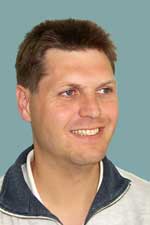THE MATING DANCE STARTS WITH THE FIRST DRAFT HORIZON EUROPE CALL
When the final call texts are on the EU portal, most of the strong consortia have already been established. If you want to be part of a Horizon Europe coordinator application, you have to read the draft work programmes and start forming a consortium as early as possible. As Professor Jacob Carstensen from Bioscience says: 'The mating dance starts with the first draft programme'.

Jacob Carstensen is already well underway with a Horizon Europe application, even though the deadline is not until September. The consortium is in place and a first draft of his application is also ready – even though the final call text is not yet available. He read the first rough draft of a relevant call last autumn, and started his process straight away. He formed the core of the consortium with former partners and also contacted several relevant partners in Europe so that the overall consortium is balanced in a European perspective.
And even though the work programme is only 80-90 per cent complete, most of it has already been finalised. Now it is only about fine-tuning the application when the final programme is available in April.
Stay ahead of the game
According to Jacob Carstensen, it is important to get access to the work programme drafts from the Commission as early as possible. You do not get them automatically, so you have to follow the process and ask to have them sent to you. You can either get them from the department's local research consultant or from the Research Support Office, which sends them to all interested parties. "It takes a bit of time to familiarise yourself with the EU lingo, and it can be a little overwhelming with the mammoth number of documents. But you have to do this to stay ahead of the game and establish a strong consortium. You can very quickly be too late. I believe that many competitive consortia have already been formed for many of the topics in the first round of applications for Horizon Europe," says Jacob Carstensen.
Network, network, network
A good network is absolutely crucial to establish a strong consortium. And the keyword is visibility - combined with talent and diligence. 'You should not expect people to come to you, even though you have produced good publications and held a lot of presentations. You have to go out and sell yourself. Put your foot in the door where relevant. You have to be proactive and reach out. Listen to the grapevine and find out who is active. This also applies internally at AU," says Jacob Carstensen.
Jacob Carstensen has been involved in several successful EU applications. He says himself that he was fortunate to be invited to join projects when he was a young researcher. And that allowed him to really show what he could do. It gave him a good outset to shape his own international network. "You have to spend a lot of time on outreach and research collaboration at the beginning of your research career. And you have to perform. Articles and conferences are all well enough, but they don’t create networks in themselves. You get something for your CV and that’s fine. But a network is established and expanded in actual collaboration," says Jacob Carstensen.
If you want the draft Horizon Europe work programmes for one or more of the clusters or instruments, feel free to contact Svend Binnerup at the Research Support Office.